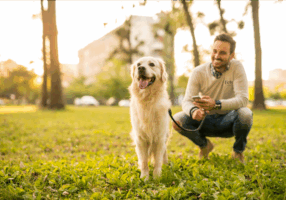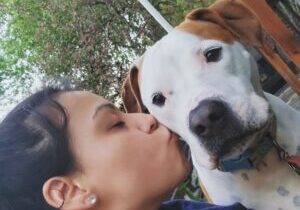Dog parents are responsible for maintaining the safety and happiness of their fur children. Feeding your pooch a well-balanced diet, giving them regular exercise, and taking them to the vet is part of the duty of a pet owner. But you can do more than that to make sure your dog lives a good and long life.
Dogs are carefree and, oftentimes, clueless, so they get into all kinds of trouble. Most often it ends into hilarity and laughter, but sometimes, it leads to danger Fortunately, you can lessen the risk of harm to your dog by following these tips.

Make Your Dog Wear a LED Collar
Whether you’re taking a walk or going outdoors with your dog at night, you need something to keep them within sight. You won’t lose your dog in the dark if you make them wear a glow-in-the-dark LED collar. In case your dog strays or escapes without your knowledge, it will be easier to spot them with a bright light shining around their neck.
Aside from a LED collar, it also helps to make them wear an identification tag at all times. The tag should have your contact details so the people who may pick up your lost dog can contact you immediately. If your dog is still untrained, it’s best not to leave your dog exploring by themselves. Keep them on a leash, or let them stay in confined spaces.
Stay In on Hot and Cold Days
Extreme temperatures are not healthy for your dog. On hot days, when the temperature exceeds 85 degrees Fahrenheit, you should keep your pooch indoors with proper ventilation and access to water at all times.
Going out on a blistering day can cause your pet hyperthermia or overheating and get their paws burnt. If there’s high humidity, they can get heatstroke or something more fatal. Hot days increase the risk of your pet getting dehydration. Watch out for certain symptoms of dehydration, such as dry mouth and nose, sunken eyes, excessive drooling, lethargy, and loss of appetite. Dangerously dehydrated dogs should be taken to the vet right away. Prevent dehydration in your dog by feeding them a well-balanced diet and leaving clean water for them to drink.
Freezing weather is just as bad for your pooch. Going out when the temperature is under 32 degrees can cause hypothermia or frostbite. You should just stay in and snuggle with your pooch under a warm blanket.
Train Your Dog to Come When Called
Dogs can distractible and willful, a combination that can get them into a lot of trouble. For example, they can stumble into a busy road, lose their way, or get into fights with other dogs if you leave them unattended for too long or even for a moment. Aside from keeping a constant eye on your pooch, you can save their life by training them to come when called.
Every time your dog goes too far away from you, they should return to your side as soon as you call their name. This prevents them from getting into shenanigans. Most importantly, this makes a lot of tasks (e.g., making them take your dog take their medicine and giving them a bath) much easier for you.
Trained dogs are happier because they can relax and trust you manage them and keep them safe. On the hand, untrained dogs are less confident, so they become anxious and insecure, lashing out at things they perceive as threats.
Minimize Anxiety and Fear
Too much stress is harmful not just to humans, but also to your canine best friend. Excessive fear and anxiety can shave off months of your pooch’s life. Nancy Dreschel, a veterinarian and animal science researcher at Penn State University, sent questionnaires to over 721 dog owners to analyze how fear and anxiety affected their pet’s lifespan. Dreschel found that extreme stranger-directed fear can shorten a dog’s lifespan by about six months. On the other hand, non-social fears (e.g., fear of loud noises, traffic, thunder, fireworks, Roomba, etc.) were linked to higher risk of skin problems in dogs.
Fortunately, you can prevent your dog from developing fear and anxiety through proper training, socialization especially during their early stages, and controlled desensitization to small anxiety-inducing situations. You can also try different ways to make your dog less anxious, like letting them wear an anxiety vest during stressful situations (e.g., the Fourth of July and thunderstorms), giving them a safe haven or crate, and offering a good distraction.
Get Your Dog Vaccinated
At several weeks old, a pup must get a series of vaccine shots to protect them from deadly diseases that commonly affect canines. The core vaccines give your pup immunity to canine rabies, distemper, parvovirus, and adenovirus (canine hepatitis).
Getting your dog vaccinated can save their life, but they also have potential adverse effects. Over-vaccination is a thing. According to the American Animal Hospital Association (AAHA) Canine Vaccination Guidelines, core vaccines last much longer than what most vets advertise, some even for a lifetime. Yearly shots do not boost their immunity. In fact, it may expose them to certain risks, like the vaccine backfiring and causing the disease it’s supposed to prevent.
New research and studies on canine vaccination and its effect on dogs’ immunity have emerged. To be a responsible pet owner, it’s important to be critical about matters concerning your dogs’ health and not just blindly follow what the experts all say.
Conclusion
Dogs are more than just pets; they’re part of the family too. That’s why pet owners do everything they can to sure their fur babies live a happy and comfortable life. Because of their nature, dogs are vulnerable to many dangers that can shorten their lives. As their human, you can protect them from many harms, physical or not, by being informed. If you want your pet live longer, follow these safety precautions and give them proper training.


![A happy Fetch! Pet Care client and caregiver [A happy Fetch! Pet Care client and caregiver]](https://fetchpetcare.com/wp-content/uploads/bb-plugin/cache/Imagen1-300x200-landscape-eab2b2598c5471a2e8b7f216eb2fdf09-.jpg)




